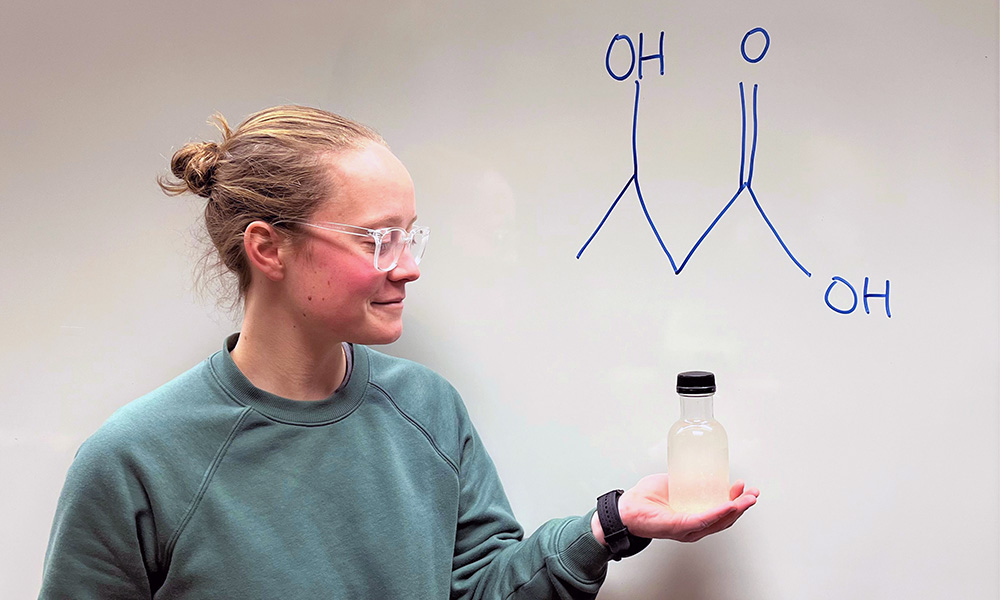
Doctoral student Kaja Falkenhain holds a ketone drink at the UBC Okanagan Exercise, Metabolism and Inflammation Lab in Kelowna.
A doctoral student at UBC Okanagan is helping lead a new study investigating a potential new tool to assist people with Type 2 diabetes manage their blood sugars—ketone drinks.
Kaja Falkenhain says that for millions of Canadians, managing Type 2 diabetes can be a lifelong commitment to self-care—including nutrition, physical activity, weight management and medication. Ketone drinks may be one more asset for them, she says.
“Through controlled studies in the lab, we’ve seen that a ketone drink supplement can lower blood glucose levels,” says Falkenhain. “We’re now ready to expand our research to a longer term, real-world trial. We’ll be looking not only at the supplement’s effect on blood glucose, but other health measures as well.”
Falkenhain, who conducts research in Dr. Jonathan Little’s Exercise, Metabolism and Inflammation Lab, says there are opportunities for people in the community with Type 2 diabetes to get involved.
Most people have heard of keto diets, but what exactly are ketones?
Ketones are molecules that are both an energy source and can act similar to a hormone in our bodies. Our livers are continually making small amounts of ketones that our cells can use for energy. When eating a low-carb diet, fasting or while sleeping, the level of ketones in our blood rises to keep up with our bodies’ energy demands. To use an analogy, we’re like a hybrid vehicle, automatically switching to this backup energy source when our main energy source—glucose—runs low.
In addition to providing this alternative fuel source, ketones also signal tissues throughout the body by binding to receptors on the surface of cells. These signalling properties are still poorly understood but they likely help regulate our overall metabolism. Recently, ketone supplements have been developed that can be consumed as a drink. These supplements can raise blood ketones without having to fast or eat a keto diet.
How might a ketone supplement help people with Type 2 diabetes?
When someone has Type 2 diabetes, their bodies can’t effectively regulate blood glucose levels for two main reasons. First, their pancreas doesn’t produce enough insulin—a hormone that acts like a key, unlocking our cells to let in glucose. Second, cells become insulin resistant—the key doesn’t work as well anymore. The result is prolonged high blood glucose that can damage organs, blood vessels and nerves.
Previous studies have shown that ketone supplement drinks can lower blood glucose without other changes to a diet. This is not to say that ketone supplements would replace diet, exercise or medication. Rather, if shown to be useful, they could be another tool in the toolbox for people who need to manage their Type 2 diabetes.
Do we understand how ketones lower blood glucose?
Not entirely. As mentioned, ketones are both an energy source and a signalling molecule. We speculate they may signal the liver to stop releasing glucose into the bloodstream, or maybe signal other tissues to take up more glucose.
Ketones may also be involved in other signalling pathways, with potential effects on cognition, heart function and inflammation. Our study will explore these questions as we look at specific markers in participants’ blood samples.
Your research team has done previous ketone supplement studies. How is this one different?
We’re going outside the lab for the first time to study the real-world effects of consuming a ketone supplement for an extended period. We plan to divide 40 people with Type 2 diabetes into two groups for a 90-day trial. One group will be asked to drink ketone supplements, and the other will be asked to drink a placebo. This will allow us to isolate the effects of the ketone supplement we are studying.
Participants will be provided with a blood pressure device and a continuous blood glucose monitor, and will visit a local lab for blood draws at the start and end of the study. In addition to measuring these health markers, we want to know if regularly drinking ketone supplements for 90 days is feasible for people living with Type 2 diabetes. For example, a participant may stick with the program, but not like the drink’s taste. That would be something we would want to know.
How do people find out more about your research and get involved in this study?
If people are interested in learning more about this study or would like to participate, they can visit: emil.ok.ubc.ca/studies/exogenous-ketones-in-type-2-diabetes-90-day-trial